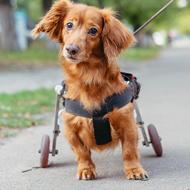
Teams create novel combined cellular and molecular treatment.
New research conducted by the Royal Veterinary College (RVC) in collaboration with the University of Bristol has led to the development of a new type of combined cell treatment that can help to improve recovery after spinal cord injury in companion animals and, ultimately, humans.
There is currently no cure for paralysis caused by damage to nerves in the spine, however, it is possible to inject cells from the nose – called olfactory ensheathing cells – into these damaged nerves. This has shown to improve walking in both experimental and companion animals and, though it is also known to be safe for humans, it has not been tested in a full clinical trial.
Another potential treatment is the injection of a molecule called chondroitinase. This has also improved recovery in experimental animals and pet dogs.
The research teams aimed to combine these two promising treatments into one, developing dog olfactory ensheathing cells that can create and release chondroitinase.
Injecting this new type of cell transplant into the spinal cord improved recovery of hand movements after spinal cord injury in rats. The treated subjects were shown to have increased accuracy when reaching and grasping compared to control subjects or those receiving cells alone.
Dr Jon Prager, postdoctoral researcher at the RVC, said: “Spinal cord injury causes chronic paralysis and incontinence, and remains a major worldwide healthcare burden, with no regenerative treatment clinically available. This study suggests that our genetically engineered cellular and molecular approach is a feasible combination therapy for spinal cord injury.
“Our findings show that this treatment leads to a modest improvement in rats’ ability to pick up treats and we are incredibly excited to see how the next stage of the research goes. This discovery is an exciting step in uncovering other possible combined treatments that have the potential to improve cell transplant therapy.”
Moving forward the researchers aims to test the efficacy of these treatments in ‘real-life’ injuries, such as those sustained by companion dogs and people.
The full paper is available to view here.



 The Veterinary Medicines Directorate (VMD) is inviting applications from veterinary students to attend a one-week extramural studies (EMS) placement in July 2026.
The Veterinary Medicines Directorate (VMD) is inviting applications from veterinary students to attend a one-week extramural studies (EMS) placement in July 2026.